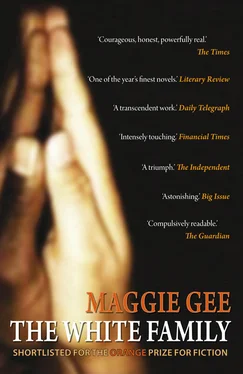It isn’t easy, being Caribbean. What they feel about Africans isn’t simple. They think that Africans are backward and strange, as well as saying they’re perpetual students. Which some of the Africans over here are –
But Kojo made it, he got his D Phil and became a lecturer, a Reader, in fact, which is next to Professor — A Reader in Comparative Literature. But his success makes Elroy feel small (because Elroy will never be as clever as Kojo). Though Elroy’s done very well, in fact, at least he has a steady job, unlike most black men of his generation.
I used to feel so proud when I went to see Kojo. DR KOJO ASANTE on the door of his office. I loved being married to a doctor. I did, I admit it, I was sinfully proud, and perhaps that’s why God took him away from me — No, nonsense, God isn’t vengeful.
Today I got up at half-seven with Elroy. He always leaves at eight a.m. When you’re up at half-seven, the mornings are long. I’d made the bed and washed the breakfast things and polished the table and watered the house-plants and done the dusting and a load of washing and ironed another by quarter past ten.
And looked out of the window. The garden I made. The garden I made to enjoy with Kojo. Long green tails of bulbs flicking up. The apple-tree where we used to picnic. And it’s still raining, always raining …
Elroy’s lighter than Kojo. He had one white grandmother. Kojo was black, dark, dark, beautiful black, a black with the sheen of coal or grapes, I loved his skin, I licked his skin. His blue-black shining West African skin. The skin of princes, emperors. Giving back light. Black full of light. I loved him so much I wanted to eat him.
When the cancer came, it did seem to eat him. At first he was slimmer. Then much too thin. And his skin lost its shine. It had a greyish tinge. It was me who insisted he went to the doctor, although I was as afraid as him, and he found so many reasons for delaying. Until he couldn’t delay any longer. In constant pain, always coughing.
And then there were things he had to do. Practical things, legal things, things which took time he did not have, but he sat with the lawyer, coughing, gasping, as words like ‘domicile’ and ‘future intention’ and ‘nationality’ droned through the air, and I brought them black coffee, but they hardly looked up. Kojo had been given a great deal of wealth by his mother’s brother, an international diplomat, descended, as Kojo was, from paramount chiefs and ultimately from Ashanti kings. We’d never had to worry about money … (So hard to get used to, being married, being rich, being loved by someone I loved in return. So hard to get used to, so hard to lose.) The Ashanti tribe believes all wealth must stay within the family, handed down through the female line, so Kojo knew that on his death they would expect his possessions to come back. He had given and given, all the time we were together, to his sisters and his sisters’ children, his cousins and his cousins’ children, but it wasn’t enough, they would expect his estate. They weren’t greedy, it was simply the custom. I knew that most of them had never accepted that I was his wife, though it was nothing personal, indeed they were warm and friendly to me, they were simply waiting for Kojo to come home and take his legitimate, Ashanti wife — I didn’t mind if they had his money.
But Kojo minded. He wanted it for me, since he couldn’t stay alive and protect me. In the end nearly all of it came to me, but I still send money to all his dependants. It makes me feel better, doing that. It somehow proves I was his wife, I am his widow, and part of his family, part of Kojo, Mrs Shirley Asante …
Now he is dead, I believe they accept me. His sister Abena brings her children over from Ghana to stay. To begin with, we were shy with each other. The little girls stared at me, deep into my eyes, touched my hair, tried to plait it, sat on my lap and stroked my face. At first my whiteness hypnotized them. Their mother seemed frightened or hostile on arrival, but she was grudgingly impressed when I cooked them dinner, jolof rice with chicken and corned beef and plantain on the side, great steaming platefuls, palm soup and peanut soup, so many choices. ‘Not bad for an obroni ,’ she said. ‘But you need more ginger. Didn’t Kojo tell you?’
I said to her, firmly, ‘He loved my food.’ I had prepared a feast, enough for ten people, to show them they were welcome, to show them I could do it, I so much wanted to be part of their family.
But she still hadn’t got over the dispute about the will. She smiled at me, but her eyes didn’t smile. She said, ‘No obroni could cook fufu , or banku .’
I put them on the table: fufu, banku . The consistency exactly right. Stodgy, starchy, but not too heavy.
By the time we had finished the meal we were friends. When she went up to bed she came and hugged me, close to her chest. ‘Oh Shirley — I love you, Shirley.’ So African! So very un-English! Over the next few days she wept with me, wept and laughed, held my hand. We swopped our memories of Kojo –
But only memories. I am a widow.
Such a bleak poor word. Widow, widow, wailing and sad, on two dull notes. All I wanted to be was wife and mother, Kojo’s wife for the rest of my life, mother of his healthy children.
Despite the sorrows (my family, number one, and the morons who said cruel things on the street) — against all the odds, we were blissfully happy. And yet there were sorrows and differences. Ashanti men may not enter the kitchen! I told him that modern British men all did, but I happily cooked for him, cared for him, loved him, and he cared for me, he cared for me … And then there was his cousin who came and made trouble. She stayed with us; I made her welcome. On the second day, when Kojo went out, she asked me why I hadn’t given him a baby. I couldn’t speak; the hurt stole my breath. Then she laughed, and said he already had children, didn’t I know? So it didn’t matter. Soon he would leave me, and go back to Ghana. ‘We are waiting for him, we know he will come.’ When Kojo came home he could see I’d been crying. I said ‘You’re not going to leave me, Kojo?’ and he stormed next door and shouted at his cousin. It was all in Tri. There was a long argument. She left, with her cases, hardly speaking to me. He came back into the house looking almost frightened. ‘I shall never ask you, Kojo,’ I said. And whatever the truth, he stayed with me.
We left our families to be together, we had to be all in all to each other. Beneath us, the Everlasting Arms. We thought there would be so many years.
Stupid tears. They never run dry.
Stop. Wipe. I have to go out.
Purse, make-up, cheque-book, coat.
How many times have I walked to this bus stop?
Oxford Street is a vision of hell. The bus goes nosing down like a barge, crushing the struggling souls beneath. From the top deck, waves of them seem to disappear, sucked slowly under the metal prow, going under the wheels, silently under.
But I’m sitting pretty on the very front seat, which I took when two screaming kids got off, how can I like them when I’ve none of my own? (Elroy would like to have kids with me, Elroy is sure we shall be lucky. He says if we marry God will surely bless us, that it’s to God’s glory if we bear much fruit, for He is the Vine, and we are the branches. Elroy already has a child, seven or eight years old, a boy, Dwayne. He never sees the mother; he claims she hates him. He wants to start again, with me.)
I was sitting behind them. Sisters, I think. Nine or ten years old, I’m not a good judge. Arms round each other, giggling and screaming …
(I wish I could make friends with Elroy’s sisters. If I had a baby, I think it would help. Elroy’s brother Winston is sweet to me, because he is sweet to everybody, the younger brother, the pride of the family, a student at London University. He has big soft eyes like a baby deer, and he’s always smiling, or laughing, as if he knows some secret joke about life. And he’s clever; so clever I could listen forever, though I wouldn’t want to make Elroy jealous. The two of us are going to a film on Saturday about the life of James Baldwin, the writer. Winston suddenly invited the family to come but none of the others was interested, and Elroy said, ‘Wasn’t he a battyboy, Winston? We did him at school. Waste of a Saturday. Why don’t you come down the club with me?’ But I said, ‘My mother’s got one of his novels. I’ll go with you, Winston, if you want me to.’ The sisters are different — one shy, one prickly. I feel so awkward with Delorice and Viola. Delorice who always has the baby in her arms and only ever talks to her, and Viola, so lean and muscular and pretty, the older sister, the driving one, managing a boutique in Kilburn and planning on partnership and then expansion. Such a fast talker, so glamorous, working out in the gym every day. With her I feel meek and flabby and stupid. I’d like her to like me, but I don’t think she does. I’d like to be part of their family.)
Читать дальше












